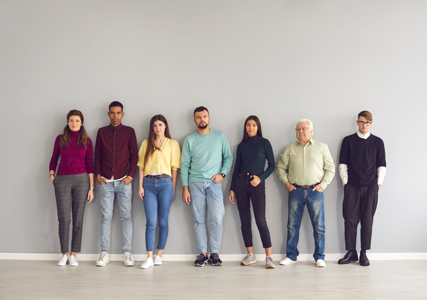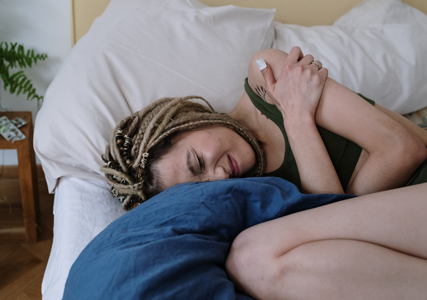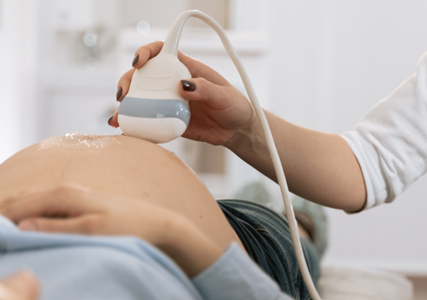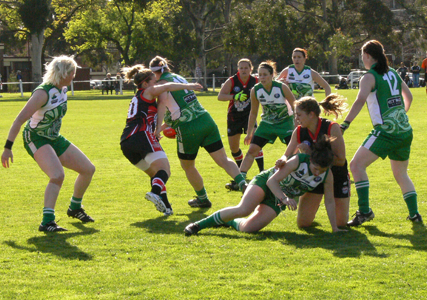Important Deakin research you should know about this Women's Health Week
Research news
This year, the Women’s Health Week (4-8 September) theme is ‘Grow your knowledge’. It’s about supporting women to make the right decisions about their health with information that’s easy to understand.
Deakin researchers are addressing the unique health issues of women and those assigned female at birth, from reproductive concerns to mental health and sporting injuries.
We’ve collected just a small sample of the work being done across Deakin to help improve women’s health and wellbeing.
Start with the right data
Women and girls account for 50% of the population, yet most health and physiology research is conducted in males. This means our knowledge of the human body, which is mostly inferred from what is observed in males, may not always hold true for females.
It really does matter – males and females are physiologically different and that includes hidden differences in hormones and genetics.
Associate Professor Severine Lamon and PhD researcher Olivia Knowles from the School of Exercise and Nutrition Sciences discuss why men are still the default subjects in medical research and the difference it might make to women’s health if things changed.

No matter the cost or added complexity, research should be for everyone and apply to everyone. (Image credit: Shuttershock)
Beating the body image blues
Social media can have devastating effects on young women’s mental and physical health, but recent research led by Associate Professor Kim Toffoletti has found that women are very aware of the risks and vulnerabilities associated with using social media. And they’re developing habits and online communities to counter the negative impacts.
The findings suggest we need alternative ways of thinking about women and girls’ social media usage, where the risks and vulnerabilities of social media use become the basis for a more nuanced way of understanding how participation on social media can affect women’s lives.

Social media users are not as naive about the toxic beauty ideals being promoted across digital platforms as we think they are. (Image credit: Liza Summer/Pexels)
Easing the pain of endometriosis
Endometriosis can cause debilitating pain that is difficult to manage with opioid medications and for many sufferers heading for the emergency department is the only option.
So, could prescribing medical cannabis instead reduce emergency department presentations among those living with endometriosis?
Deakin’s 'EndoCannED' trial, led by Professor Antonina Mikocka-Walus from the Centre for Social and Early Emotional Development (SEED) is seeking to answer that question.

Endometriosis is a chronic inflammatory condition which affects one in nine women and those assigned female at birth. There is currently has no cure. (Image credit: Cottonbro studio/Pexels)
The ability to grow another human being and all it brings
The journey through falling pregnant, being pregnant, giving birth and motherhood takes women through the gamut of experiences from joy to despair to everything in between and back again. It can also take an enormous toll on their physical and mental health.
We know that physically and mentally healthy and emotionally supported mothers mean the next generation has a greater chance of being physically and mentally healthy as well.
From investigating why prospective parents in rural areas struggle to access IVF services to exploring women’s experiences of maternity care during the COVID-19 pandemicand the role midwives play in reducing the rate of caesarean births to understanding the risk factors behind perinatal depression, Deakin researchers are contributing to new knowledge about every stage of the journey and improving the health and wellbeing of women and children.

Deakin research has found that where you live affects how easily you can access the services you may need to realise your dreams of having a baby. (Image credit: Mart Production/Pexels)
A woman’s place … is on the sporting field
From the Australian Diamonds taking out the Netball World-Cup for a record 12th time, to the Australian Women’s cricket team stacking up as the ‘greatest women’s team in any era, across any sport’ to the Matilda’s journey to the soccer World Cup and the growing number of girls playing rugby and Australian rules, women’s sport is in the spotlight.
Deakin researchers are working on keeping women athletes healthy, with a School of Medicine study led by Dr Stephen Gill investigating how to reduce the risk of injury, especially knee injuries, to female football players. Associate Professor Severine Lamon is also studying the role of testosterone in the performance of female athletes.

Injuries to the ACL are one of the most common knee injuries among athletes and the highest category of injury in AFLW. (Image credit: Wikimedia Commons).
The text of this article is licensed under the Creative Commons Attribution (CC BY) 4.0 International license. We'd love for you to share it, so feel free! Please note that images, videos, graphics and logos are not covered by the CC BY license and may not be used without permission from Deakin University or their respective copyright holder. If you have any questions please contact researchcomms@deakin.edu.au.
Thanks for reading! You can find more stories like this at www.deakin.edu.au/research/research-news-and-publications. We ask that Deakin University and individuals are appropriately credited and that you include links back to this website. Quotes in this article can be extracted for other articles provided individuals are appropriately credited and you include a link back to the article URL.
Share this story

Key Fact
Women’s Health Week is about supporting women to make the right decisions about their health with information that’s easy to understand.
